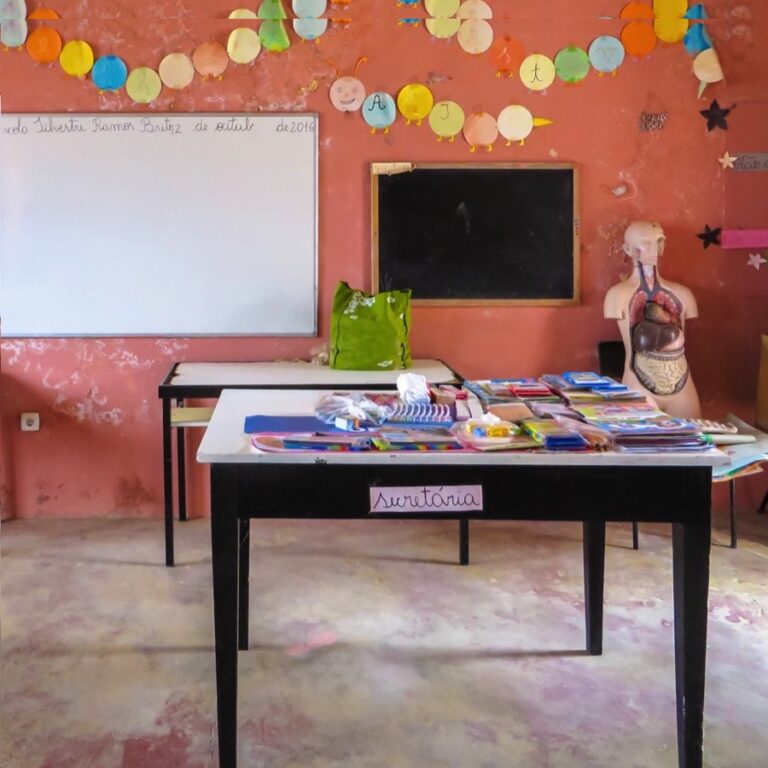1
00:00:03,256 –> 00:00:04,169
Sou o Martim.
{{I’m Martim.}}
2
00:00:04,701 –> 00:00:07,050
Nunca fui uma pessoa de falar muito.
{{I’ve never been one to talk much.}}
3
00:00:07,717 –> 00:00:09,825
Falar, deixo para os outros.
{{I leave the talking to others.}}
4
00:00:10,485 –> 00:00:14,602
Sempre quis ser uma pessoa que dá muito e fala pouco.
{{I always wanted to be a person who gives a lot and talks little.}}
5
00:00:15,192 –> 00:00:17,400
Até agora, não tive problemas.
{{So far I haven’t had any problems.}}
6
00:00:17,897 –> 00:00:20,508
Passei muitos anos sozinho a trabalhar,
{{I’ve spent many years working alone,}}
7
00:00:20,749 –> 00:00:23,892
e fiz muitas coisas com as minhas próprias mãos.
{{and I’ve done a lot of things with my own hands.}}
8
00:00:24,489 –> 00:00:27,873
Dei muito de mim aos outros e senti-me feliz.
{{I gave a lot of myself to others and I felt happy.}}
9
00:00:28,622 –> 00:00:35,132
Pus tudo o que sou num projeto solidário em África, onde construí uma escola para crianças.
{{I put everything I am into a solidarity project in Africa, where I built a school for children.}}
10
00:00:35,718 –> 00:00:42,275
Eu e uma equipa de várias pessoas, fizemos e desfizemos o projeto até ficar perfeito.
{{A team of several people and I built and unbuilt the project until it was perfect.}}
11
00:00:42,778 –> 00:00:48,527
Percebi que podia ser feliz a viver assim, ser uma pessoa livre, com tudo para dar.
{{I realised I could be happy living like this, being a free person, with everything to give.}}
12
00:00:49,242 –> 00:00:56,508
Satisfez-me compreender que, como sou uma pessoa calada, podia ajudar os outros sem ter de dizer muito.
{{I was pleased to realise that, as I am a quiet person, I could help others without having to say much.}}
13
00:00:57,180 –> 00:01:02,175
Tive de voltar para Portugal há uns meses, mas planeio voltar a África novamente.
{{I had to return to Portugal a few months ago, but I plan to go back to Africa again.}}
14
00:01:02,819 –> 00:01:06,700
Revi o projeto mais recente que a minha antiga equipa me enviou.
{{I reviewed the most recent project that my old team sent me.}}
15
00:01:07,472 –> 00:01:11,653
É uma excelente oportunidade para regressar e não posso perdê-la.
{{It’s a great opportunity to go back and I can’t miss it.}}
 We respect your privacy and have a ZERO TOLERANCE for spam.
We respect your privacy and have a ZERO TOLERANCE for spam.
















Sorry, I can’t find how this comes about. What tense is this verb and did it change because of the la at the end?
(last sentence in the text)
Thank you for your help!
Olá! The verb is in the infinitive (perder), but combined with a 3rd person clitic pronoun (-a). Since the infinitive ‘perder’ ends with a consonant, this consonant is dropped when merged with the clitic pronoun, and an L is added to the pronoun, changing it from ‘-a’ to ‘-la’:
perder + a -> [perder-a] -> [perde-la] -> perdê-la
In the end, an accent must be added to indicate the proper pronunciation of this form (stressed on the second syllable) and distinguish it from ‘perde-la’ (unaccented, stressed on the first syllable), which also exists, but is derived from the second-person singular (tu perdes + a = tu perde-la).
Thank you, Joseph! That is indeed very complicated (at least for me)
I am a new member and just realised I can translate the transcripts a great feature just working my way around this app
Are you making any more podcasts
Have you thought about doing online ZOOM lessons ie A2 CIPLE EXAM PREPARATION
I did a 12 week course for my exam and it was invaluable
Enjoying my membership regards lynn
We have not done any online Zoom lessons in the past, but we’ll definitely keep the suggestion in mind. Thanks! And yes we will make more podcasts in the future. 🙂 So glad you’re enjoying your membership!
“Pus tudo o que sou num projeto solidário “
Eu não sabia bem o gramático acima sobre “ o que sou (ser)” , mas eu compreendo “eu pus tudo num projeto solidário “ obrigada
Olá 🙂 A tradução inglesa literal de “tudo o que sou” é “all that I am”. Significa que o Martim (a personagem) se entregou por completo ao seu projeto solidário.
In the quiz the questions asks “Qual o plano do Martim para o futuro?”
but shouldn’t it be “Qual é o plano do Martim para o futuro?” (missing é)
Olá! Both are correct (Qual o… & Qual é o…).
In questions that start with “Qual” or “Quais”, the verb ser can usually be omitted if you so choose. You may find both variations of this question type sprinkled throughout the units and podcasts/shorties, to make sure people are exposed to both 🙂